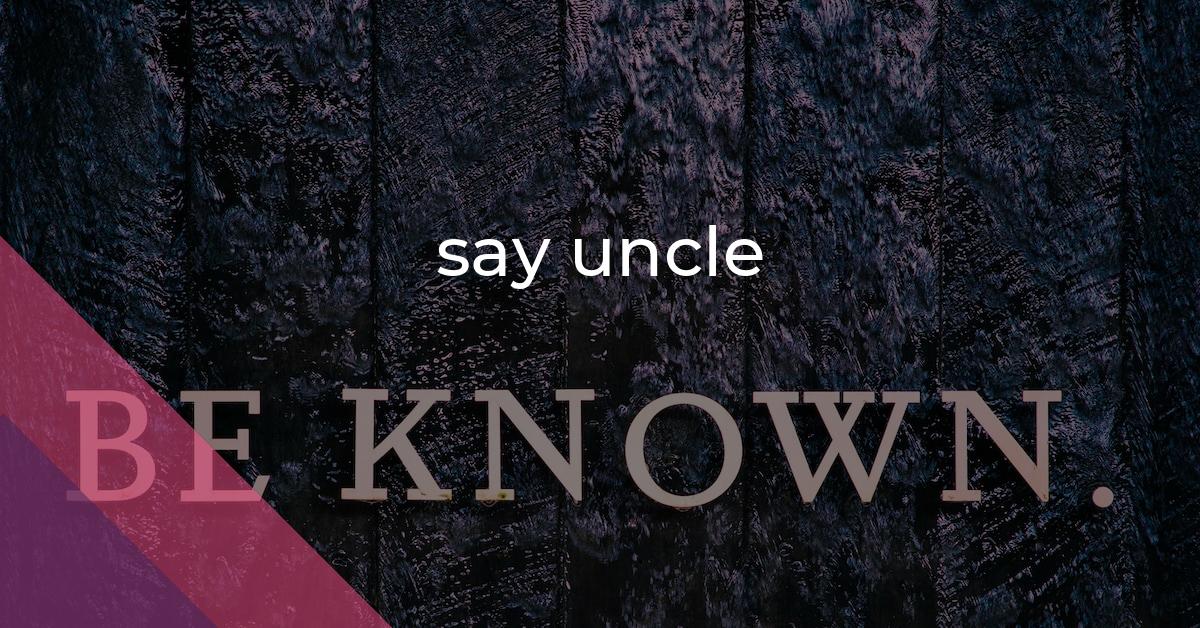say uncle: Idiom Meaning and Origin
What does ‘say uncle’ mean?
The idiom "say uncle" means to admit defeat or surrender.

Idiom Explorer
The idiom "see you next Tuesday" is a euphemistic phrase commonly used to discreetly refer to someone as a derogatory term. It is a playful way of indirectly expressing frustration or annoyance towards someone without using explicit language.
The idiom "say when" means to indicate when something is enough or satisfactory.
The idiom "say that" is used to express surprise or disbelief when someone makes a statement that is unexpected or hard to believe.
The idiom "say no more" is used to convey that there is no need to provide further explanation or information, as the listener already understands the intended meaning.
The idiom "say it all" means to fully express or reveal everything, leaving nothing unsaid or unexplained.
The idiom "say goodbye" means to part or separate from someone or something, often permanently. It implies a finality or ending to a relationship, situation, or opportunity.
"Save it" is an idiom that means to stop talking or expressing an opinion, usually because the speaker's point is not wanted or considered relevant by the listener.
"Put up or shut up" is an idiom that means to either take action or remain quiet about a challenge or boast you have made. It implies that if you cannot back up your words with action, then it is better to say nothing at all.
The idiom "put an end to" means to bring something to a conclusion or stop it completely.
The Relentless Call
The idiom "say uncle" is primarily used in the United States. Its exact origin is not well-documented, but there are theories about its meaning and history. One theory suggests that it originated in children's play fights. As the story goes, when one child had another in a physical hold, they would demand that the other child say "uncle" to admit defeat and end the fight. This phrase may have been adapted over time to refer to any situation where someone is forced to give up or concede.
Another theory proposes that the phrase has its roots in actual torture methods used in the past. It is said that victims of torture would sometimes be compelled to say "uncle" as a signal to their tormentors that they could no longer endure and were willing to cooperate. As time passed, this saying may have evolved into a metaphorical expression of surrender.
Today, "say uncle" is commonly used in a more lighthearted manner, often in playful or humorous contexts. It is usually employed when one person is persistently teased, mocked, or challenged by another and eventually gives in to the pressure. Saying "uncle" in this context signifies that the person has finally admitted defeat or yielded to the taunting.
Bob's your uncle is another idiom that is related to "say uncle." The exact origin of this idiom is uncertain, but it is commonly used in British English. It is typically added to the end of a list of instructions or steps to indicate that everything will be fine or successful. For example, if someone asks you how to make a cup of tea, you might say, "Put the tea bag in the cup, pour boiling water, add milk, and Bob's your uncle, you have a cup of tea!" This idiom adds a playful and colloquial tone to the conversation.
give in is another idiom related to "say uncle." It means to surrender, yield, or submit to something or someone. When a person gives in, they acknowledge that they cannot withstand or resist any longer. This phrase can be used in a variety of contexts, such as giving in to temptation, giving in to pressure, or giving in to someone's demands.
I'll be a monkey's uncle is yet another idiom related to "say uncle." This phrase is often used to express disbelief or astonishment. It originated in the early 20th century and is believed to be a reference to the theory of evolution. The phrase suggests that the speaker finds something so surprising or unlikely to happen that they would become a relative of a monkey, which is seen as absurd. It adds a humorous and exaggerated tone to a conversation.
Lastly, cede the field is an idiom related to "say uncle." It means to surrender or give up in a competition or conflict. This phrase is often used metaphorically, especially in sports or debates, to convey the idea of admitting defeat or accepting that the opposing side has won. It implies that one side has acknowledged the other's superiority or dominance in a particular situation.
"say uncle" is an idiom used in the United States. Its exact origin is uncertain, but it is thought to have originated from children's play fights or actual torture methods. Today, it is used in a playful and teasing manner to indicate surrender or admission of defeat. Other related idioms include "Bob's your uncle," "give in," "I'll be a monkey's uncle," and "cede the field." These idioms add color, humor, and express different forms of surrender or disbelief in various contexts.
Example usage
Three examples of how the idiom "say uncle" can be used in a sentence:
- After a long and exhausting wrestling match, Jack finally said uncle and admitted defeat.
- I challenged my friend to a game of arm wrestling, but he quickly said uncle as soon as I applied pressure.
- The bully continued to taunt Tom until he couldn't take it anymore and finally said uncle.
More "Surrender" idioms



